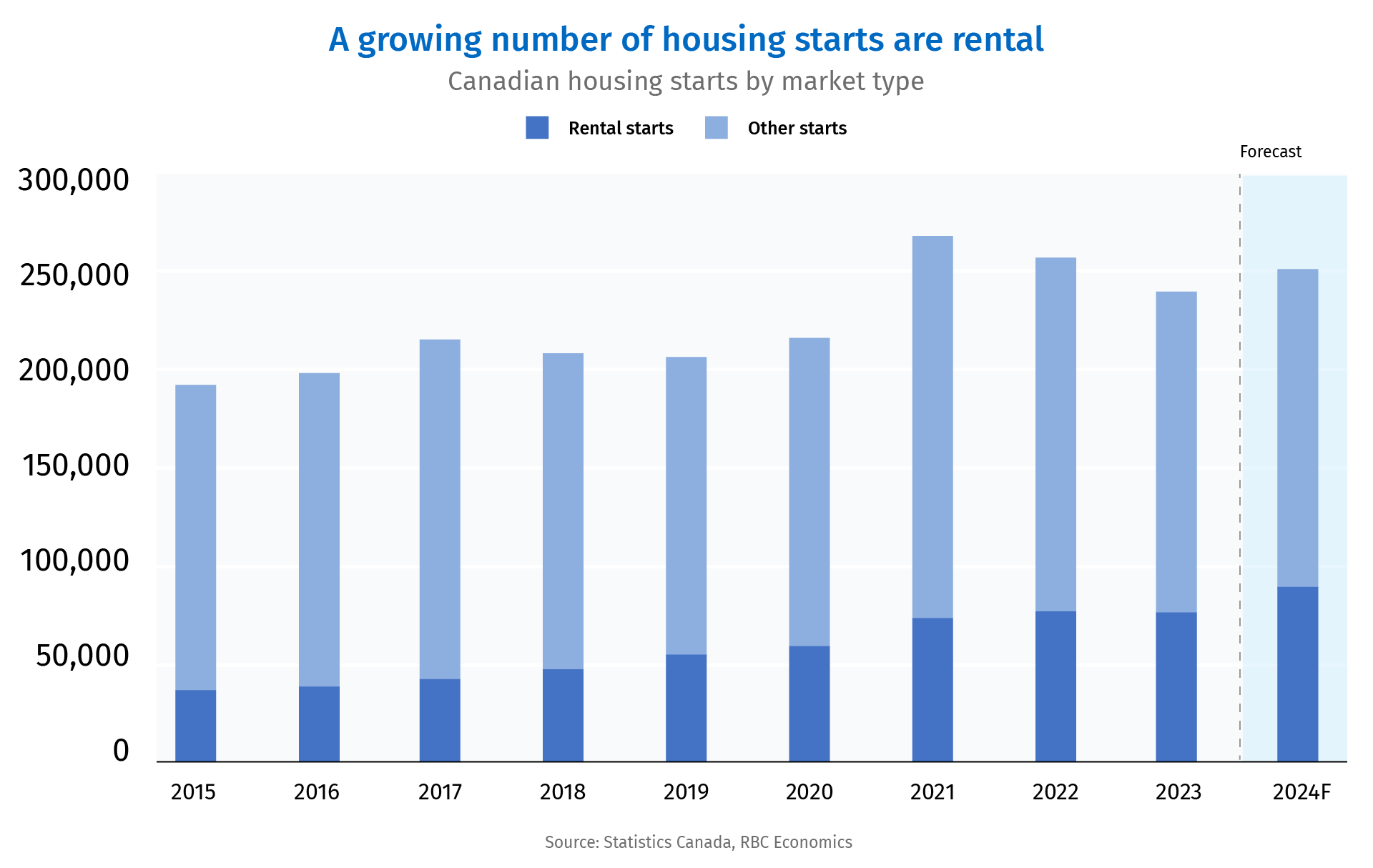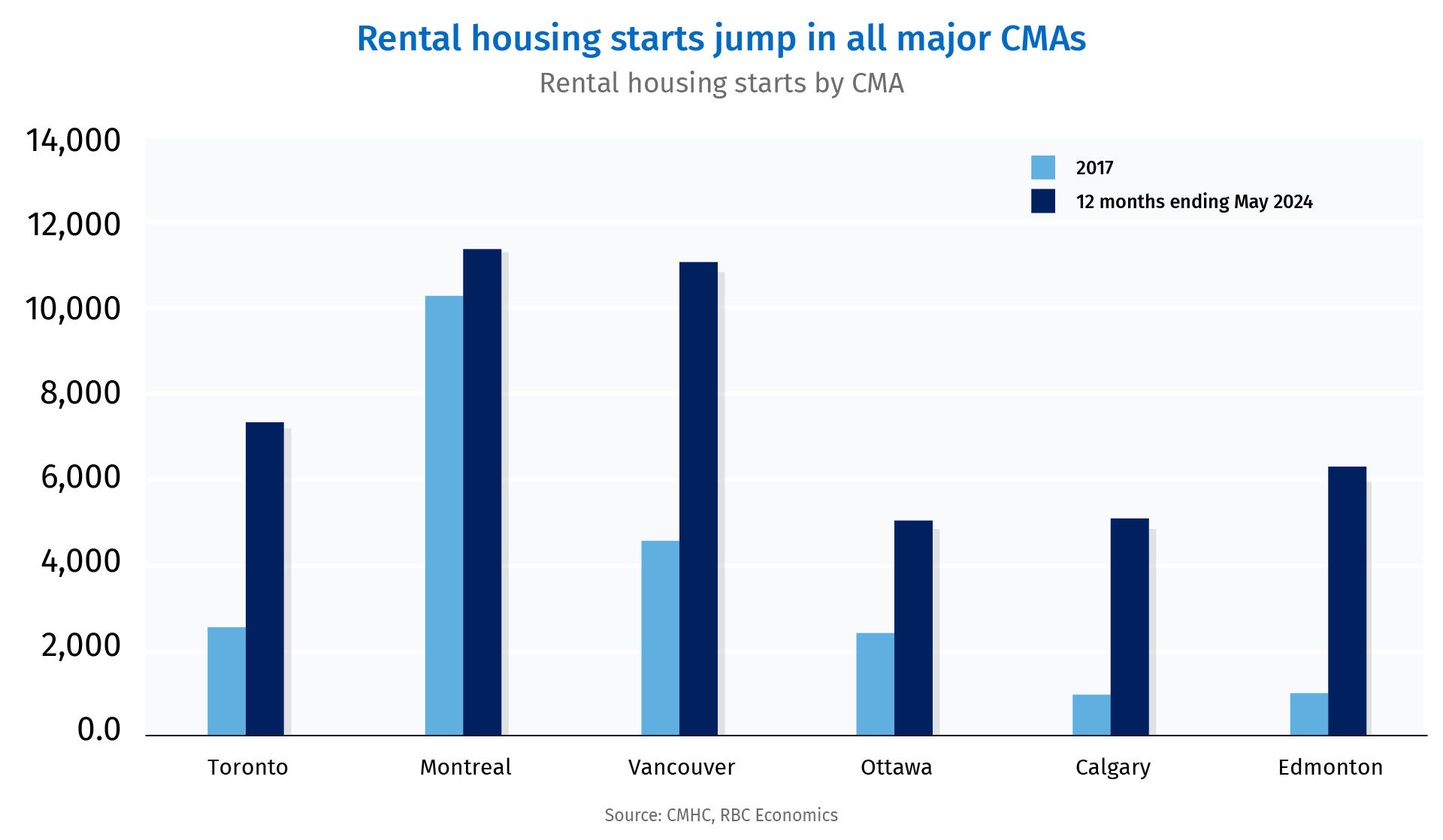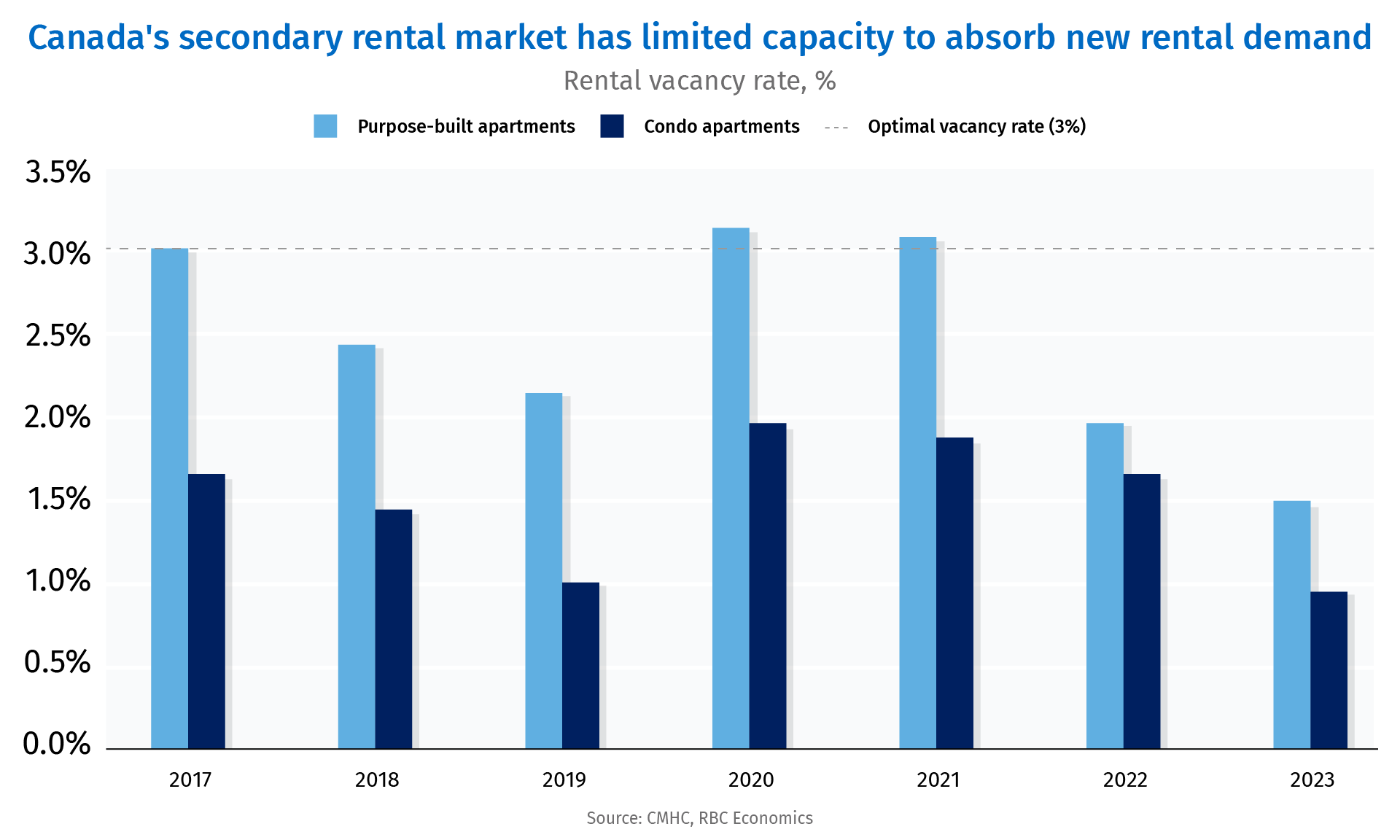There hasn’t been this much rental housing under construction in Canada in a generation—which is encouraging news given the acute supply shortages across the country. But even more construction will be needed as rental demand continues to rise rapidly in the years ahead, says a report by RBC.
The report found:
- Rental housing starts surpassed 80,000 per year in 2022 and 2023, nearly doubling the average pre-pandemic (2015–2019) annual increase.
- Fast-growing demand for rental housing and a suite of policy measures provide enough support to keep building activity strong—even in the high interest rate environment.
- A backlog in demand, however, is likely to result in quick absorption of new units when they come to market.
FULL REPORT
Canada’s housing supply problem is undeniable, but it doesn’t mean homebuilding is weak. Builders started construction on 240,000 units in 2023, which would have been a 36-year high if not for a short-lived spike earlier in the pandemic.
This year is turning into another busy one for homebuilders. Housing starts are already up 11% from last year, and the anticipation of further interest rate cuts is projected to keep this trend going.
But not all residential projects are picking up. Most homebuilding activity is coming from new rental construction projects, which have nearly doubled from six years ago. Meanwhile, the construction of single-family homes has dwindled to just three-quarters of the housing start activity seen in 2017.

Growing demand, policy measures drive rental construction projects
Rental housing starts reached the highest in decades in 2022 and 2023 with more than 80,000 new units started each year. That number is set to rise even more in 2024 as surging demand and new policy measures tip the scale for developers despite persistently high inflation challenges and skilled labour shortages.
On the demand side, demographic shifts and deteriorating homeownership affordability have made rental housing increasingly popular. The rate of homeownership among Canadians has fallen an estimated 2.5 percentage points (as of the last census) after peaking at 69% in 2011.
But, rental housing is also slipping out of reach for many as more Canadians move into the rental market. A severe market imbalance has put a lot of upward pressure on rents, bringing annual rent growth to its fastest pace on record, reaching 8% in 2023—well-outpacing inflation (3.9%) and wage growth (2.8%).
Growing rental supply shortages and soaring rent caught the attention of developers and policymakers. Governments have responded with a suite of rule changes and incentives to promote high density and rental housing developments.
Since 2017, all levels of government have put forward measures to grow Canada’s rental stock. The federal government introduced the National Housing Strategy and more recently, Canada’s Housing Plan—which include programs and initiatives for boosting rental housing construction. Ontario and British Columbia implemented their own housing plans as well, with measures to get more rental housing built.
At the municipal level, Vancouver and Toronto have made strides in expanding their social housing stock. These cities have also relaxed rules around zoning, parking and floorspace requirements for residential housing—and modulated development fees for rental construction projects to encourage more development.
Together, strong demand for rental accommodation and government support have contributed to a substantial uptick in rental construction while most other types of development projects are at a standstill. We expect policies in Canada’s latest Housing Plan will help carry this momentum forward.

More is needed to bring rental market back to balance
However, the rental market supply shortage is massive. The rental vacancy rate fell to an all-time low (1.5%) last year—well below the equilibrium level (3%) in virtually all census metropolitan areas (CMAs).
Demand for rentals has increased more than three times faster than the purpose-built rental stock has grown between 2017 and 2023. Other types of rental units such as condo apartments and secondary suites have filled part of that gap, but they have also come short. Rental vacancy rates for condos are even lower than for purpose-built rental apartments, dropping to 0.9% in Canada last year.

The ramp-up of rental housing starts is welcome and should help rebalance Canada’s rental housing market over time. The challenge, though, will be delivering units Canadians can afford in the right locations. Steep development and construction costs, along with restrictive (although easing) zoning policies still pose serious challenges to growing the supply of affordable rental housing.
Rachel Battaglia is an economist at RBC. She is a member of the Macro and Regional Analysis Group, providing analysis for the provincial macroeconomic outlook and budget commentaries.

Mario Toneguzzi
Mario Toneguzzi is Managing Editor of Canada’s Podcast. He has more than 40 years of experience as a daily newspaper writer, columnist, and editor. He was named in 2021 as one of the Top 10 Business Journalists in the World by PR News – the only Canadian to make the list. He was also named by RETHINK to its global list of Top Retail Experts 2024.
About Us
Canada’s Podcast is the number one podcast in Canada for entrepreneurs and business owners. Established in 2016, the podcast network has interviewed over 600 Canadian entrepreneurs from coast-to-coast.
With hosts in each province, entrepreneurs have a local and national format to tell their stories, talk about their journey and provide inspiration for anyone starting their entrepreneurial journey and well- established founders.
The commitment to a grass roots approach has built a loyal audience on all our social channels and YouTube – 500,000+ lifetime YouTube views, 200,000 + audio downloads, 35,000 + average monthly social impressions, 10,000 + engaged social followers and 35,000 newsletter subscribers. Canada’s Podcast is proud to provide a local, national and international presence for Canadian entrepreneurs to build their brand and tell their story





